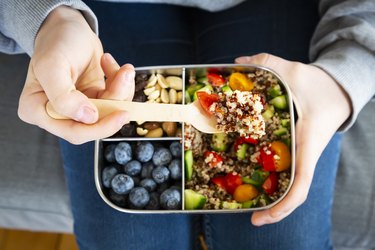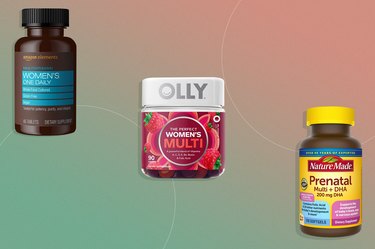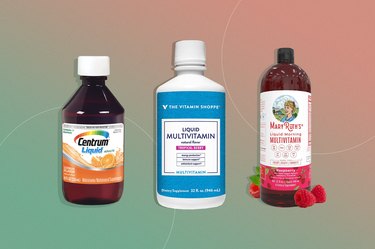
Ulcerative colitis is a chronic inflammatory bowel disease (IBD) that causes inflammation and ulcers in the large intestine and rectum. If you've been diagnosed with ulcerative colitis, it's essential to learn which foods may trigger your symptoms in order to help manage the disease.
Best Foods to Eat
Video of the Day
The best foods to eat with ulcerative colitis may vary because the disease affects everyone differently. In general, though, "try to eat a balanced diet that includes lean proteins, fresh fruits, vegetables, healthy fats and grains," says Nicole Goodrich, RDN, founder and president of Anderson's Nutrition.
Video of the Day
"Since ulcerative colitis is such a personalized disease, it is important to listen to your body," Goodrich says. "Take notes on which foods cause symptoms and which foods keep your symptoms away. Staying hydrated is crucial, as well."
Recommendations include:
- Lean proteins: Lean proteins are an essential part of your diet when dealing with ulcerative colitis. They provide necessary nutrients and help you maintain weight and muscle mass. Recommended lean proteins that may be well tolerated include chicken breast, turkey, lean cuts of pork, fish, eggs, nut butters, soy and tofu, according to the Crohn's & Colitis Foundation.
- Fresh fruits and vegetables: There are a variety of fruits that are low-fiber, nutrient-rich and well tolerated, including bananas, melons and cooked fruits such as apples. Avoid or limit eating any raw fruits that have a skin. Vegetables should be skinless, seedless and thoroughly cooked, the Crohn's & Colitis Foundation says. Examples include asparagus, carrots, squash and potatoes.
- Grains: Enriched or refined grains are typically easier on the digestive tract. Examples of these types of grains include oatmeal, cream of wheat, puffed rice cereal, white pasta and white rice. Whole grains like brown rice and quinoa are more difficult to digest and may trigger symptoms.
What to Eat During a Flare-Up
"If a flare-up occurs, eat foods that are easy to digest and gentle on the gastrointestinal tract," Goodrich says. "You should also reduce dairy and switch to processed grains and cooked vegetables."
She suggests the following sample menu during a colitis flare-up:
- Breakfast: Cream of Wheat
- Lunch: Chicken noodle soup
- Dinner: Chicken, cooked carrots and mashed potatoes
Introducing New Foods During Remission
If you’re in remission from ulcerative colitis, you may want to try introducing new foods as tolerated. However, it's important to make this a gradual process and to listen to your body to determine if and when you can have more flexibility in your diet.
Foods to Avoid or Limit
Certain foods can cause inflammation in the colon and trigger symptoms. The Mayo Clinic notes that these symptoms can vary and may include diarrhea, cramping, abdominal pain, blood in your stool, fever, fatigue, weight loss and an urgency to have a bowel movement.
Trigger Foods
Trigger foods may vary from person to person, according to the Crohn's & Colitis Foundation, but the following foods and beverages are common triggers for people with ulcerative colitis:
- Spicy foods
- High-fat foods (think: foods with lots of butter and/or cheese)
- Fried foods
- Alcohol
- Caffeinated drinks
- Sugary drinks like soda
- Foods and drinks made with artificial sweeteners or sugar alcohols
- Foods high in lactose, like ice cream and custard
High-fiber foods like raw leafy greens, nuts and seeds, beans and legumes, apples with skin and cruciferous veggies like cauliflower may lead to gas and discomfort for some people, but fiber is an important part of a healthy diet, even for people with IBD.
The Crohn's & Colitis Foundation encourages people with IBD to experiment with these foods to find ways to eat them without triggering symptoms. For example, you could try blending leafy greens into a smoothie and opt for almond butter instead of whole almonds.
"It is best to experiment with fiber to see how your body reacts," Goodrich says.
Inflammatory Foods
Certain foods can increase your risk for inflammation over time, which can worsen ulcerative colitis, per the Crohn's & Colitis Foundation. Try to limit these foods in your diet, including:
- Red meat, including beef, pork, lamb and veal
- Processed meats, including deli meat, hot dogs, sausage and bacon
- Certain fats, such as coconut oil, palm oil, butter and cream
Ultra-processed foods (think: packaged foods with very long ingredient lists) and artificial sweeteners may also contribute to inflammation, although more research is needed in this area.
Nutritional Supplements May Be Needed
Your doctor may order a blood test to see if you have any nutritional deficiencies due to ulcerative colitis. According to the Crohn's and Colitis Foundation, people who have ulcerative colitis may not be getting the necessary nutrients from a well-balanced diet alone.
Therefore, your doctor may recommend vitamin and mineral supplements such as calcium, iron, folic acid, zinc and vitamins D, B12, A, E and K.
Is this an emergency? If you are experiencing serious medical symptoms, please see the National Library of Medicine’s list of signs you need emergency medical attention or call 911.


